Bermuda Travel Guide
Welcome to the taste2travel Bermuda Travel Guide!
Date Visited: July 2017
Introduction
Exploring Bermuda has been on my bucket list for some time, so when I found a cheap flight from New York City I snapped it up. I then turned to booking.com to book my accommodation and saw the few hotels on the island were charging upwards of $600 per night. Ouch! Where were the cheap guest houses and hostels? I turned to Airbnb.com and found a wonderful, comfortable room in a family home for less than $100 per night – a real bargain for this island.

Warwick beach on the south coast.
Bermuda is one very expensive travel destination – a real challenge for those travelling on a budget. This British Overseas Territory doesn’t market itself as a budget-friendly destination, the island is all about 5-star resorts, fine dining restaurants and expensive boutique shopping – a destination for the well-heeled.

Today a UNESCO world Heritage site, St. Georges served as the capital of Bermuda for the first 200 years.
I originally planned to visit during June of 2017 but the already high prices were in the stratosphere thanks to Bermuda being the venue for the Americas Cup. I arrived two weeks after the cup and found retailers in town were still selling surplus clothing (from the cup) at full retail prices – there are never any bargains on this island.
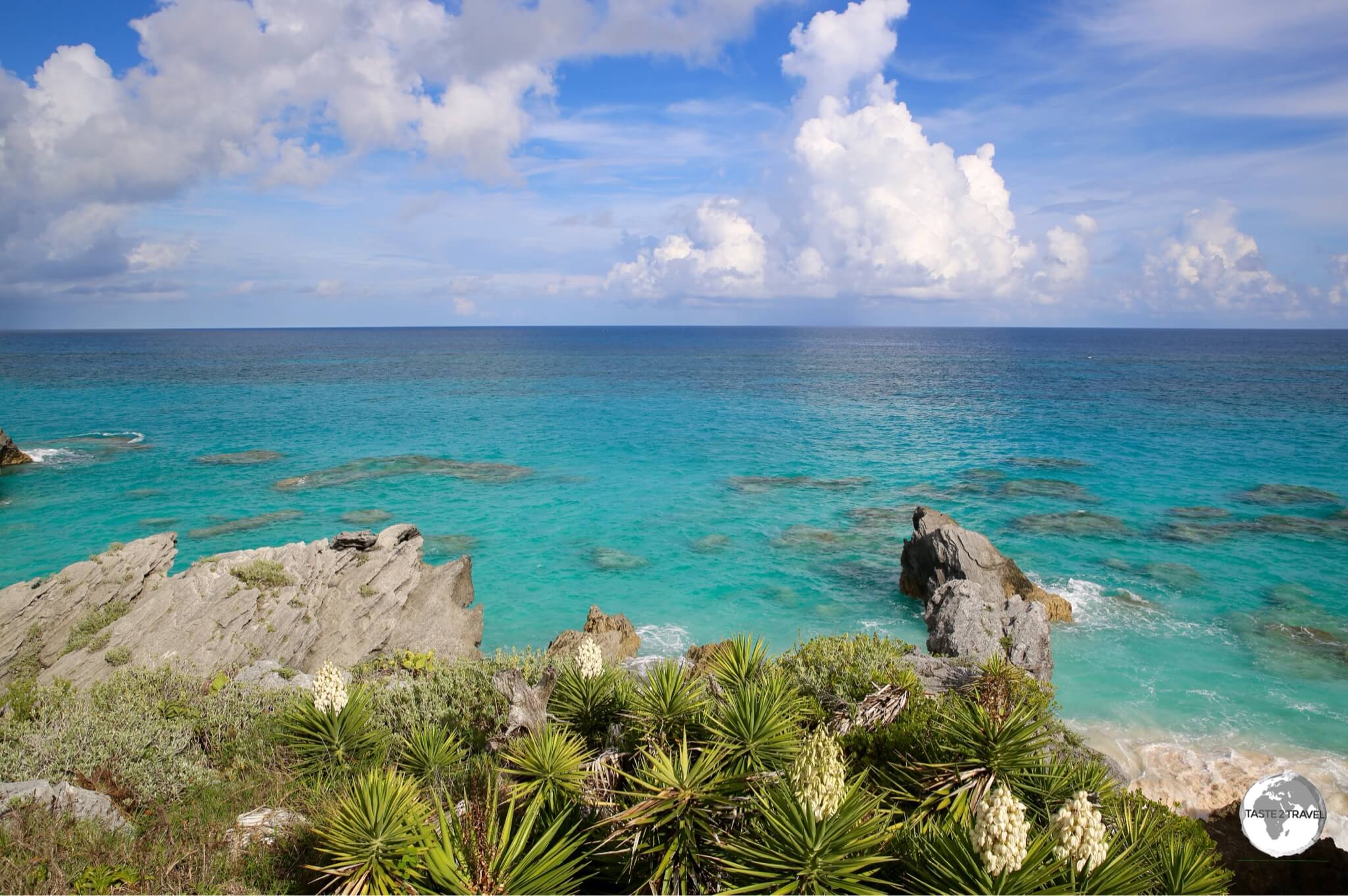
South Coast beach.
Despite the scary prices, there are ways to keep costs down – such as eating in local cafes (where you can get a meal for around $12), or by shopping in supermarkets and self-catering.
If you choose to eat in tourist/ ex-pat restaurants, you should always be prepared for ‘sticker shock‘ when you receive the bill. In one cafe I paid $20 for a sandwich, which then came close to $30 once the gratuity and my drink was added.
Stormy Skies Over St. Georges
- The starkly white limestone roofs of St. Georges create a stunning contrast against a dark, stormy sky.
- A white chimney contrasts starkly against dark blue storm clouds over St. Georges.
- A white limestone-slab roof glows against a dark, stormy sky over St. Georges.
- A typical, blindingly-white, Bermuda rooftop in St. Georges.
At the North Rock Brewing company, a small glass of one of their fine craft beers cost me $13.80 – that left a nasty aftertaste! I met a vacationing American family who had dinner one evening in a hotel restaurant. During their dinner the servers kept pouring water, which the family thought was house water. In the end they had a charge on their bill of $130 for water. You can read more about the high cost of living here.
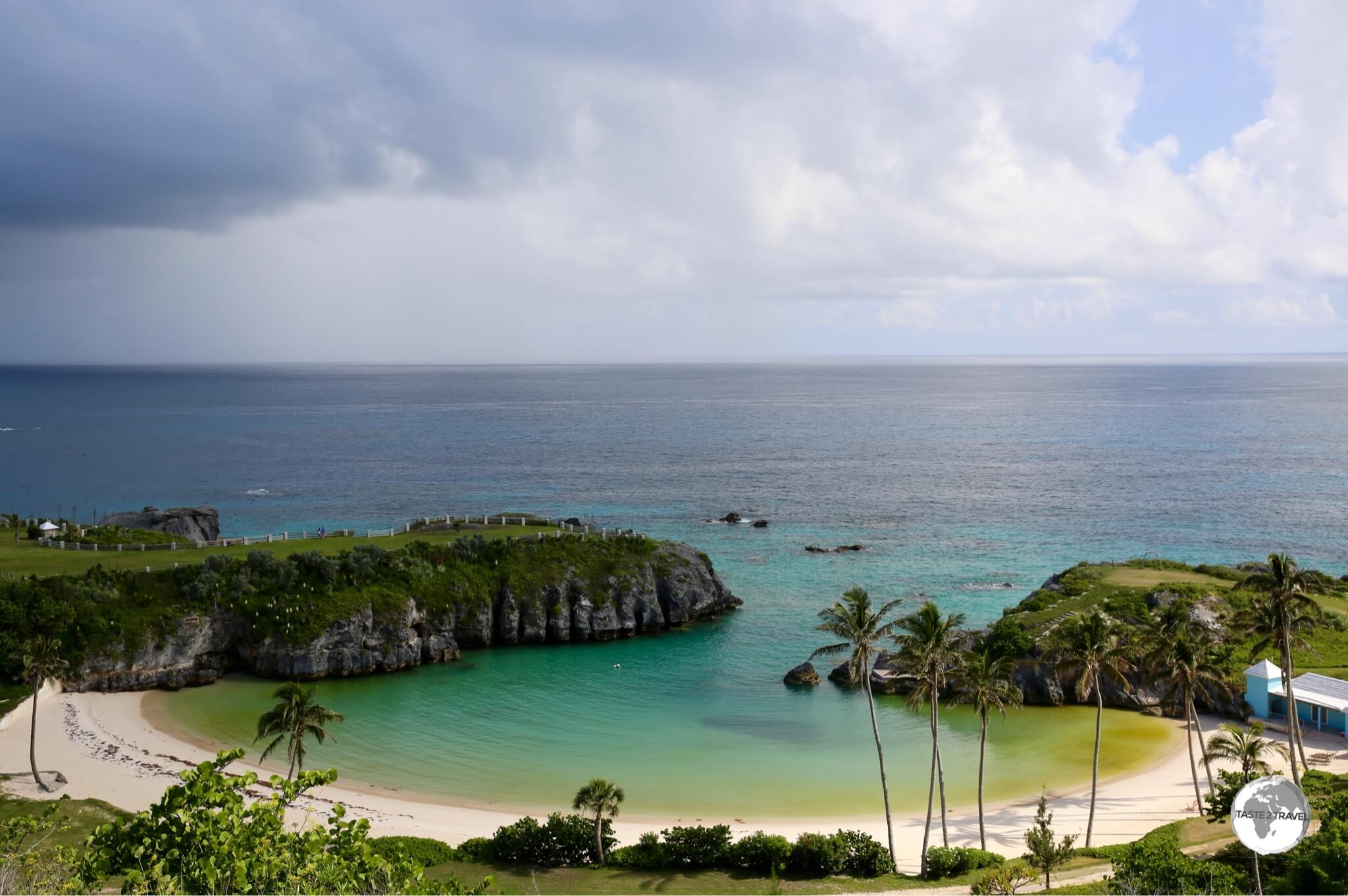
Typical South Coast beach
If you can live with the high costs then Bermuda is a beautiful, engaging and rewarding destination and one not to be missed. On this well-ordered island, there is something for everyone – from a pristine environment, lots of history, a rich culture and so much more.
Then there are the wonderful Bermudans – friendly, welcoming and always hospitable. Despite the budget-busting costs, Bermuda is a veritable paradise, one which I enjoyed and hope to return to again one day.
Bermuda Shorts
“The short-pant is a terrible fashion choice, unless it is from Bermuda.”
So said Winston Churchill after a visit to Bermuda in the 1940’s.

Bermuda shorts in every colour of the rainbow at ‘Tabs’ in Hamilton.
Bermuda shorts were originally designed by the British Army for wear in tropical and desert climates. During WWII, there was a shortage of clothing in Bermuda. At the time, the General Managers of two local banks (who were concerned that their male employees would not have suitable clothing to wear) arranged for a local tailor to make two pairs of formal shorts (modelled on the shorts of the British military), for each of their male employees.
This was the beginning of Bermuda shorts as acceptable business attire in Bermuda. Since their inception, local designers have improved the design of the shorts, using better materials and brighter colours.

Bermuda shorts on sale at Tabs in Hamilton.
One thing I noticed while on the island is how popular the shorts are with local businessmen and government employees. Bermudans wear their shorts for all occasions – including weddings.

“How to wear your Bermuda Shorts” by Tabs of Hamilton
Source: “Tabs” – Authentic Bermuda Shorts
Men on Bermuda wear their Bermuda shorts in a variety of bright colours, always with long (knee-length) woollen socks – often in the same colour as their shorts. The look is completed with formal (black/ brown) shoes, a freshly ironed dress shirt with tie and a navy blue jacket.

Bermuda shorts come in a variety of colours, with ‘Bermuda red’ (same colour as the flag) being especially popular.
Bermuda Triangle

Boundaries of the fictitious Bermuda Triangle.
Source: Wikipedia
A travel guide about Bermuda wouldn’t be complete without mention of the Bermuda Triangle. Since the 1950’s, writers have written fictional stories about ships and aircraft mysteriously disappearing in the vicinity of the triangle. The boundaries of the triangle were defined in a pulp fiction publication – Argosy – in 1964.
The area defined by the triangle is one of the busiest shipping lanes on the planet and while ships have become wrecked/ disappeared, there is no evidence to suggest that paranormal activity was responsible for any of these misfortunes. Either way, the story of the triangle has sold lots of books over the decades and (today) lots of tacky ‘I went to Bermuda and survived the Bermuda Triangle..’ souvenirs.
Heather Nova

Heather Nova in concert.
It would be amiss of me not to make mention of one of my favourite musicians, who happens to be a native of Bermuda – Heather Nova. I first saw Heather in concert in Zurich, Switzerland in 2009.
The concert was a magical experience – from her enchanting, mystical voice, to the meaningful lyrics of each of her carefully composed songs.
Heather was touring Europe while I was visiting Bermuda so no chance of seeing her perform at home. If you ever have the chance to attend one of her concerts (she is often touring Europe) I would recommend you do so, but be warned, there is a magical quality about her music and she will put you under her spell.
Location
Hamilton, Bermuda
Bermuda is an extinct, isolated volcano, located atop a seamount, far from anywhere, in the middle of the North Atlantic ocean. The closest landmass is Cape Hatteras (North Carolina), on the east coast of the United States – approximately 1,070 km (665 mi) to the north-east.

“Bermuda Blues”.
At different periods in history, the seamount has been completely submerged which has allowed marine organisms to form a limestone cap which covers the entire island and provides the white/ pink powdery sand beaches and turquoise water for which Bermuda is famous.
History

The Bermudan flag flying alongside the Union Jack.
Unlike its Caribbean neighbours to the south, remote and isolated Bermuda was never settled by indigenous Indians from the Americas. The island remained undiscovered until 1505 when Spanish navigator Juan de Bermudez passed by, while sailing back to Spain from a provisioning voyage to Hispaniola (present day Dominican Republic/ Haiti).
The island was named after Bermudez who returned again in 1515 dropping off some pigs who could be used as food by anyone unlucky enough to be wrecked on the isolated outpost.

Martello Tower in St. Georges parish, part of line of defensive forts built by the British.
Bermuda continued to remain off the radar until 1609, when an English provisioning ship – the Sea Venture (captained by Sir George Somers) – would be deliberately ship wrecked on its reef.
The ship was en-route to the new English colony of Jamestown, Virginia when it became caught in a fierce storm and was blown off course. When the reefs of Bermuda were spotted days later, the ship was deliberately run aground in order to save all survivors and allow them to salvage parts from the ship.
The survivors spent ten months on Bermuda, where they found plenty of food – including a thriving pig population. During this time, they were able to use tools and parts from the Sea Venture to build two new ships – Perseverance and Deliverance – one of which they filled with food stores sourced from the island.
When the two new vessels were complete, most of the survivors set sail, completing their journey to Jamestown. Upon arrival they found a starving colony, which they were able to save using the supplies from Bermuda. Had this not happened, England’s new colony of ‘America’ would most likely have failed.
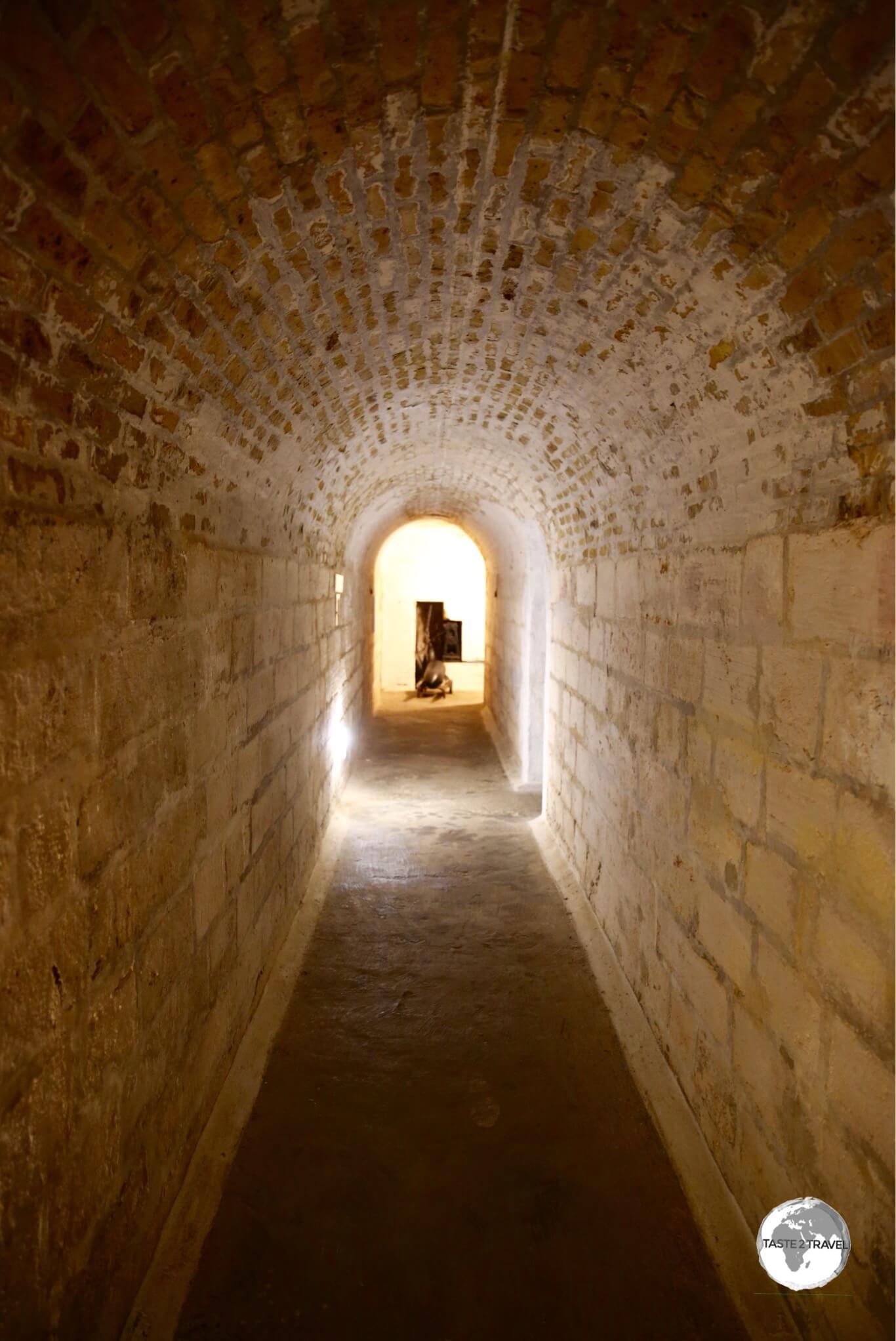
A tunnel underneath Fort St. Catherine, which is located in the parish of St. Georges.
When Somers departed Bermuda for Virginia, he left two volunteers on the Island to maintain Britain’s territorial claim. As a result, Bermuda has been continuously inhabited as a British territory since the wrecking of the Sea Venture in 1609, and claims its origin from that date, and not the official settlement of 1612.
Initially the island was run as a company, with land divided up between shareholders. Tobacco was the only agricultural crop grown but wasn’t profitable due to the small size of landholdings. Due to the lack of agriculture, slavery was not as important to Bermuda as it was on the ‘plantation’ islands in the Caribbean.

The streets of historic St. Georges are lined with beautifully renovated stone buildings all of which are topped with white limestone-slab roofs.
With almost no natural resources, Bermudans would eventually turn their attention to other sources of income. For centuries, Bermudan salt traders would spend six months of each year in the Turk & Caicos islands (click to read my TCI Travel Guide) where they harvested salt, which was then transported and sold in America.
Due to the Bermudan presence on the islands, Britain claimed TCI as a territory – a claim which continues today. Following territorial disputes with the Bahamas over the TCI, and a change in salt markets, the Bermuda salt trade ended.

A painting of a Bermudian Sloop.
In the 17th century, the islanders gave up on agriculture and instead turned their attention to the sea and everything maritime. For years, Bermuda Cedar had been used for ship building and the island had become famous for its shipyards.
Design refinements led to the development of the famous ‘Bermuda Sloop‘ which sailed faster than any other boat at the time. These speedy sloops were perfect for pirates and privateers and Bermudian merchant vessels turned to privateering at every opportunity during the 18th century – preying on the shipping of Spain, France and other nations.
During the American War of independence, Bermudian sympathisers sold sloops to American rebels through third-country ports. It’s said these sloops greatly aided the American war effort, allowing the Americans to defeat the British.
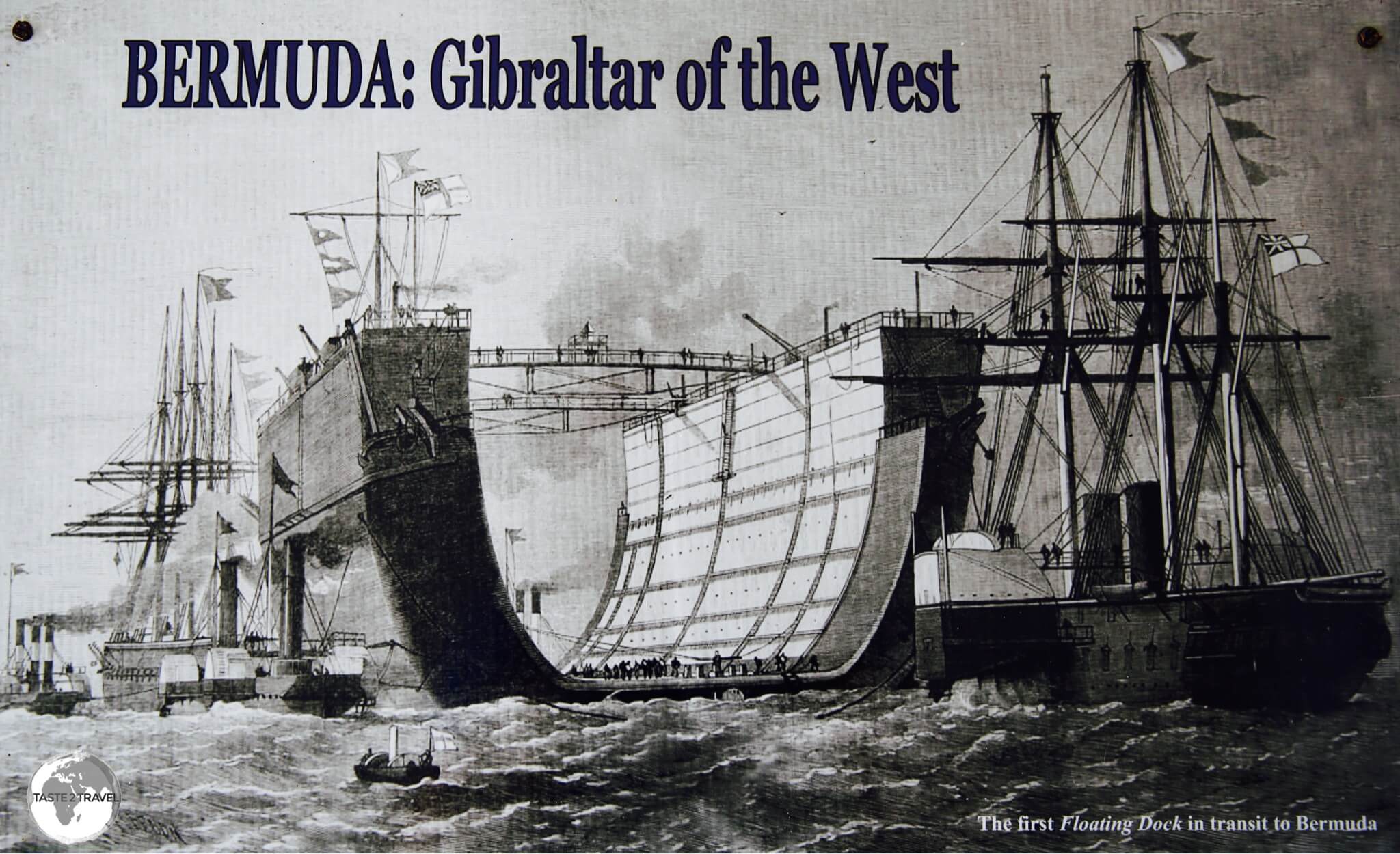
The massive Bermuda Floating Dockyard being transported from London to Bermuda.
After the war, Britain (who had lost control of all it’s ports on the US east coast) turned it’s attention to fortifying Bermuda and creating a strategic regional Naval Dockyard on the island, the centre piece of which was the world’s 2nd largest floating dockyard, which was constructed on the River Thames (London) over a period of three years then towed across the Atlantic to Bermuda in 1869. Today you can view the semi-submerged rusty remains of the dockyard in the mouth of Spanish Point.
Since WWII, Bermuda has positioned itself as a centre for Offshore Banking – the main industry on the island – with tourism being second. The official currency of the island is the Bermudan Dollar, which is pegged to the US dollar. Businesses on the island accept payment in both currencies.

The Bermuda Blue Bird is featured on the Bermuda $2 bank note.
Architecture

Shops in St. Georges town with their white ‘rainwater catchment’ limestone rooftops.
As I flew into Bermuda, I couldn’t help but notice all the blindingly white rooftops reflecting the dazzling tropical sunlight. White rooftops are a unique architectural feature of the island, with every type of building sporting the same white pointy cap.
The reason for this is a very practical one – besides the fact that it also looks very pretty. On an island which lacks rivers or any other fresh water source, rainwater is the only source of fresh water and all rooftops are required (by law) to serve as rainwater catchments.

Painting at the Masterworks Art Gallery showing workers constructing a Bermudan rooftop.
Roofs are constructed using limestone slabs (a natural filter), which step down to a trough which then directs water into underground holding tanks. All homes are painted in pretty pastel colours with thick stone walls designed to withstand hurricane-strength winds.
Bermuda Architecture
- The colour green is a popular choice for gables on Bermuda and contrasts nicely against the, normally, blue sky.
- A pink gable and white chimney contrast nicely against the blue Bermuda sky.
- A green gable in St. Georges.
- A white chimney in St. Georges contrasts starkly against a cloudless blue sky.
- The town of St. Georges is home to many colourful, historic buildings.
- A pink gable and white chimney in St. Georges.
- A porcelain plate embedded into a chimney in St. Georges.
- A white chimney and pink gable contrast against a clear blue sky in St. Georges town.
Sights

A map of Bermuda showing the different Parishes.
For a small island, Bermuda packs in a lot of sights – from historical towns, museums, galleries, gardens, old forts, stunning beaches, diving, snorkeling, sailing, hiking, bird watching and so much more. After ten days of zipping around on my scooter I still hadn’t covered everything.
Included here is a brief overview of sights from the most northern parish (St. Georges) to the most southern (Sandy’s):
St. Georges Parish

Today, a UNESCO world Heritage site, St. Georges served as the capital of Bermuda for the first 200 years.
The UNESCO World Heritage listed St. Georges town was Bermuda’s first English settlement and served as the capital of Bermuda for its first 200 years. The town today is pleasantly renovated and offers a wealth of sights for visitors to explore:
- St. Peters Church – the oldest Anglican church in the New World, which includes a segregated Slave Graveyard.
- Somers Garden – where the heart of George Somers is buried.
- Tucker House Museum – once home to Henry Tucker (former president of the Governors Council), this museum provides a view of life in a typical home from the 1700’s

Colourful St. Georges, the former capital of Bermuda.
- Kings Square – the main square which includes the historic town hall.
- Bermuda National Trust Museum – housed in the former Globe Hotel, this museum highlights Bermuda’s role in the American Civil War.
- World Heritage Centre – Located on the waterfront, this renovated, former warehouse provides an overview of the history of St. Georges.
Apart from sightseeing, the town offers lots of boutique shopping, restaurants and cafes.

The Unfinished Church in St. Georges.
The Unfinished Church
Located on a hill overlooking St. George’s Town, construction of the Gothic-style Unfinished Church was commenced in 1874 but never completed due to lack of funds and disagreements between local parishioners. The site is administered by the Bermuda National Trust who have closed the grounds due to structural deterioration causing risks to visitors. You can walk around the perimeter fence from where you can take photos. The church is located on the aptly named Church Folly Lane.
Fort St. Catherine

View of Catherine’s Beach from Fort St. Catherine.
Located over the hill from St. Georges town is beautiful St. Catherine’s Bay and Fort St. Catherine. The impressive fort is surrounded by a dry moat and accessed by a drawbridge and contains a large number of tunnels, towers and ramparts.
Today, the fort houses a museum, which is one of the more interesting on the island. It was just offshore from the fort that the Sea Venture was wrecked in 1609. The entire crew came ashore where the Fort St. Catherine now stands. Further along the north coast are several smaller forts which you can visit.
St. Catherine’s Bay

The Rainbow Parrot-fish is the largest herbivorous fish in the Atlantic with males reaching 1.2 metres.
Source: www.arkive.org
The protected cove at St. Catherine’s Bay is ideal for swimming and offers good snorkeling. On the other side of the fort is the small, protected Achilles Bay. The bay offers good snorkeling and it’s here you have a chance of spotting the giant Rainbow Parrot fish. Further along the coast is the much more developed (and busier) Tobacco Bay.
Hamilton Parish
Crystal Cave

The main chamber of Fantasy Cave.
The Crystal Cave complex is comprised of two caves (tickets sold separately) – Crystal Cave and Fantasy Cave. The caves were discovered in 1905 by two 12-year-old boys searching for a lost cricket ball and have been a tourist attraction ever since.

Native to Bermuda, the White-tailed Tropicbird or Longtail, seen here on the north coast of Hamilton parish.
A great place to photograph the Longtail birds is along the north coast of Hamilton Parish – just to the north of Flatts village. This part of the coast is comprised of small cliffs where the birds have their nests.
Flatts Village

The colourful and very picturesque ‘Flatts Village’.
Beautiful Flatts Village is located in a small inlet and is home to the Bermuda Zoo and Aquarium. It’s also home to the Village Pantry – a great place for breakfast and coffee (see ‘Eating Out‘ below).
Smiths Parish
Spittal Pond Nature Reserve
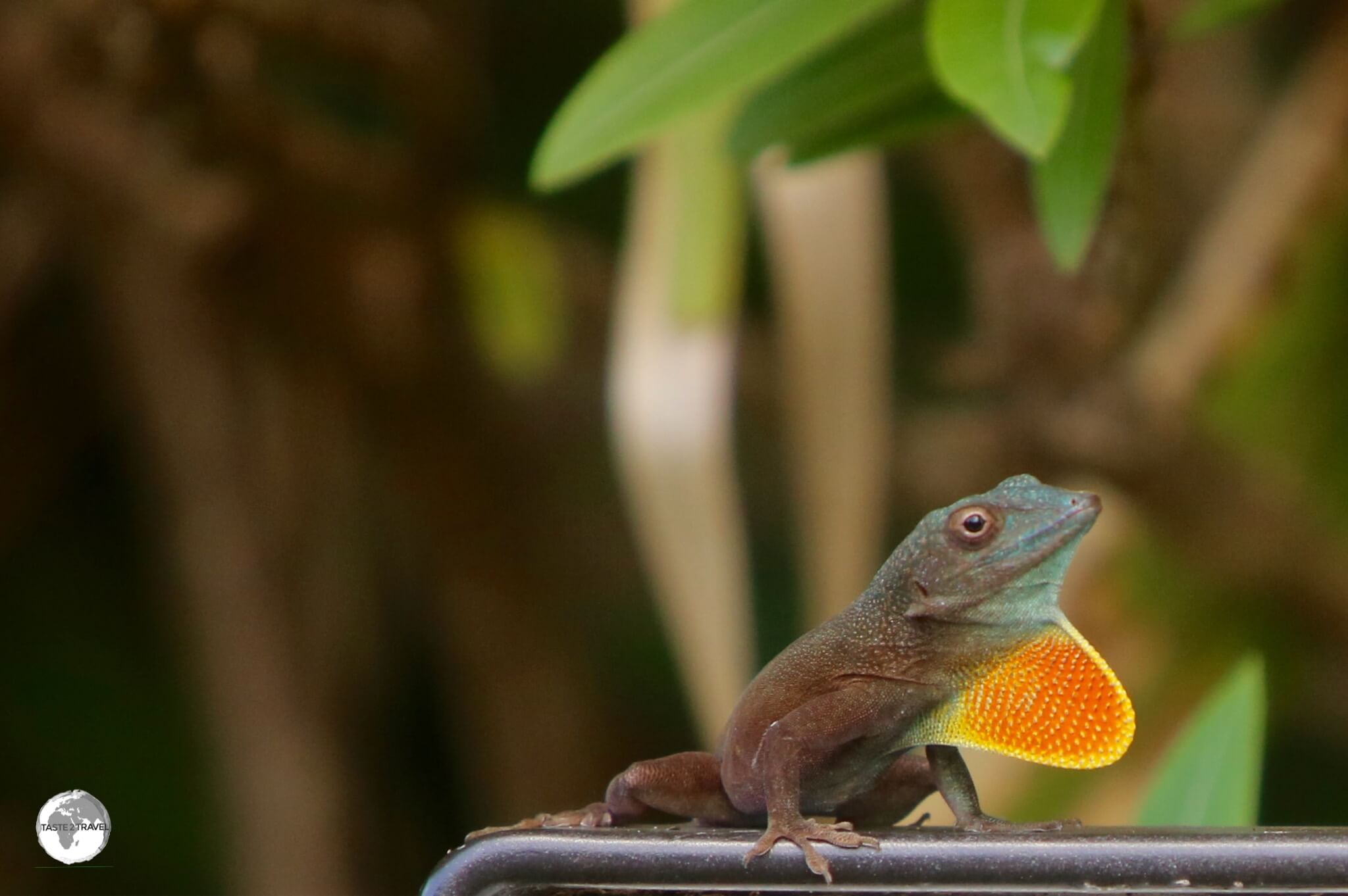
A Jamaican Anole at the Spittal Pond Nature Reserve.

A recent introduction to Bermuda, the Yellow-crowned night heron, at Spittal Pond Nature Reserve.
Devonshire Parish
Arborteum

A Jamaican Anole at the Arborteum.
One sight worth visiting in Devonshire Parish is the Arborteum. Once British army property, this national park covers 22 acres of trees, shrubs, meadows and forest. If you wish to photograph the Bermuda Eastern Blue Bird, you’ll find them here.
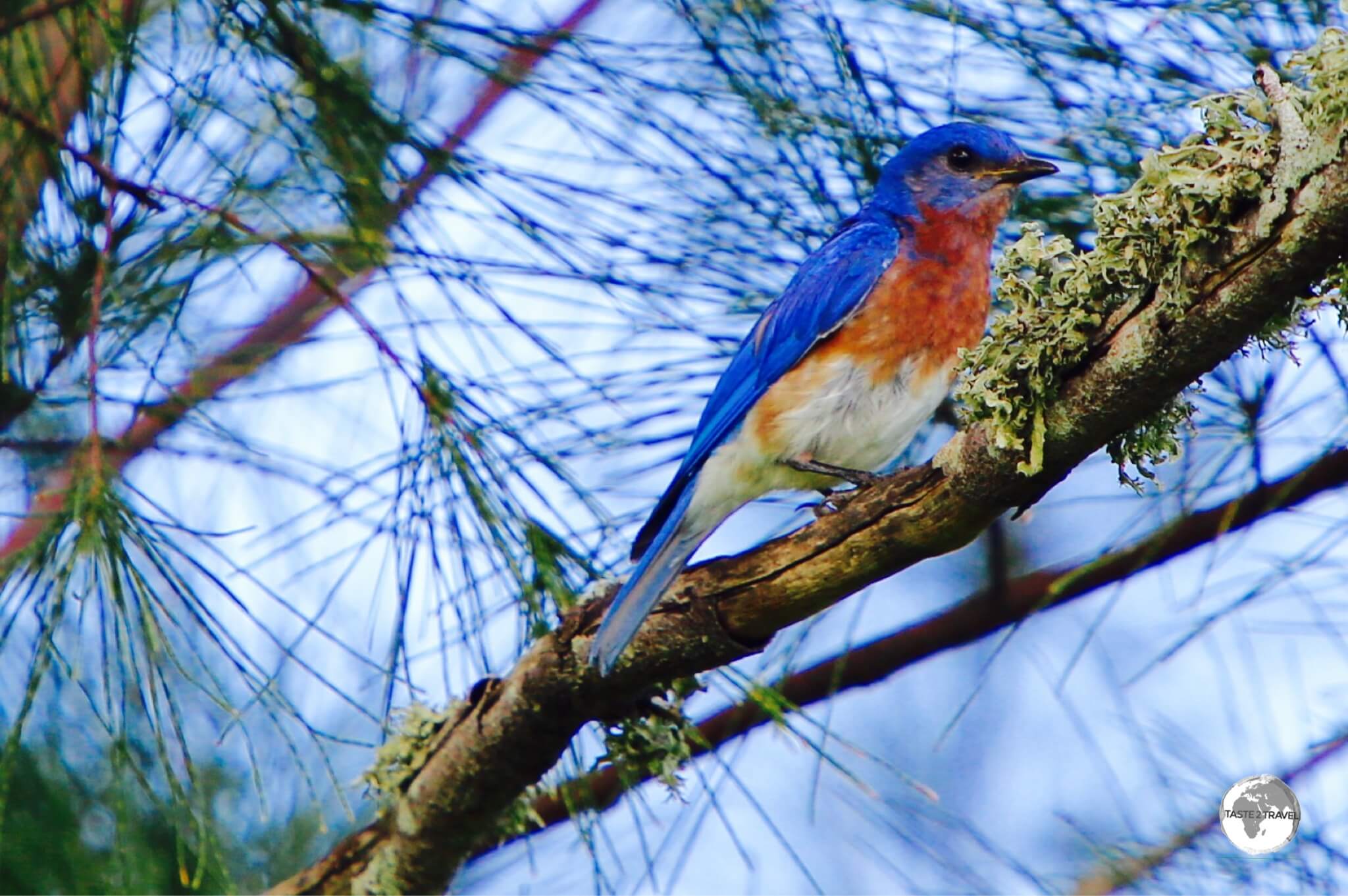
The star of the $2 bank note, the Bermuda Eastern Blue Bird, at the Arborteum.
Pembroke Parish
Hamilton – the bustling capital of Bermuda.

Front street, the main street in downtown Hamilton.
Capital of the island since 1815, Hamilton is a small, vibrant and a friendly city. It’s the heart and commercial hub of the island. Front Street runs along the waterfront and is the life and soul of the city. It’s here you’ll find shops, bars, cafes and restaurants.

The Cathedral of the Most Holy Trinity in Hamilton.
Away from the waterfront, you’ll find the Bermuda Cathedral of the Most Holy Trinity, City Hall and Bermuda Art Gallery.

The Cenotaph and the Cabinet Building in Hamilton.

The Sessions House houses the chambers for Bermuda’s House of Assembly & the Supreme Court.
Bermuda Underwater Exploration Institute
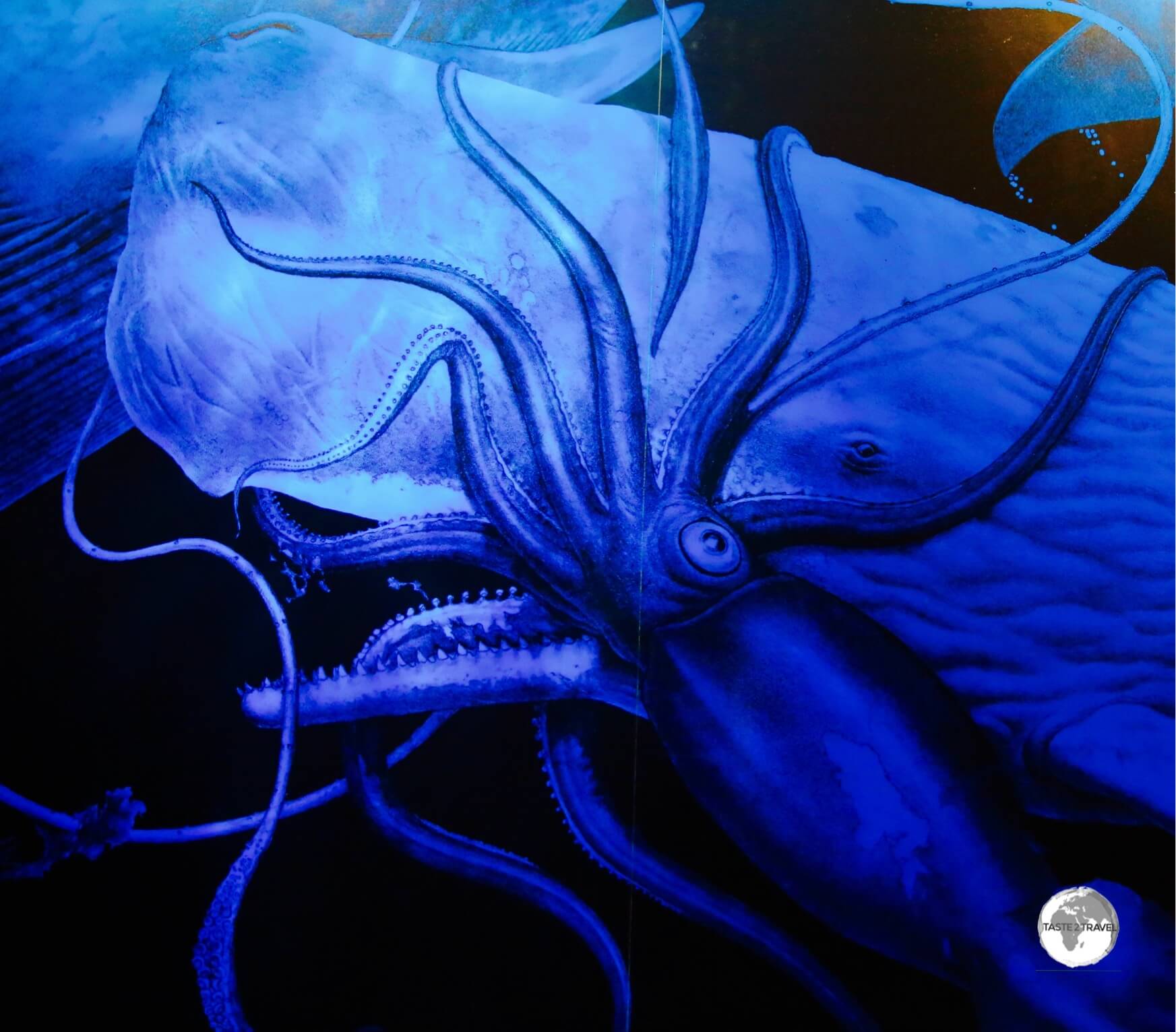
Artwork at the Bermuda Underwater Exploration Institute.
Located on the outskirts of Hamilton is the Bermuda Underwater Exploration Institute (BUEI), whose aim is to enhance understanding (through interactive exhibits) of the ocean including its diverse marine life, corals etc. The museum also includes information on Bermuda ship wrecks, including treasure found from diving expeditions.
Masterworks Art Gallery

Artwork at the Masterworks Art Gallery.
Located inside the Bermuda Botanical Garden, Masterworks Art Gallery is a non-profit organization dedicated to art made in and inspired by Bermuda. The gallery displays some 1400 masterpiece collections including paintings, photographs, drawings and maps. The gallery cafe is a wonderful place for lunch.
Warwick Parish
Warwick Long Bay Beach

A view of Warwick Long Bay beach on the south coast.
Located on a quiet stretch of the south coast, Warwick Long Bay Beach is a fabulous, beautiful half-mile stretch of pink sand. The pink hue is caused by the crushed shells of a microscopic organism called foraminifera.

Storm clouds over Warwick Beach, one of the finer beaches on the south coast of Bermuda.
The turquoise water is ideal for swimming and there are plenty of quiet little coves either side of the main beach.
Southhampton Parish
Horseshoe Bay Beach

Storm approaching Horseshoe Bay Beach.
Ranked in 2016 by Conde Nast Traveller as one Top 20 beaches in the world – stunning Horseshoe Bay Beach features a curved stretch of pink sand against the blue waters of the Atlantic.
Gibbs Hill Lighthouse

Gibbs Hill Lighthouse is the tallest lighthouse on Bermuda and was one of the first lighthouses in the world to be made of cast-iron.
Perched high on a hill, overlooking everything in Southhampton Parish, is the Gibbs Hill Lighthouse – the tallest lighthouse on Bermuda and was one of the first lighthouses in the world to be made of cast-iron. For the most panoramic view of Bermuda, you can climb the 185 steps to the top outdoor viewing platform.
Sandy’s Parish
Royal Naval Dockyard

View of the Royal Naval Dockyard precinct from the Bermuda National Museum.
The Royal Naval Dockyard was once used as a British navy base but today plays hosts to cruise ships and hoards of cruise ship passengers.
The historic area around the dockyard is home to the National Museum of Bermuda and the Clock-tower Shopping mall, where you’ll find lots of tacky souvenir shops housed inside an impressive British Navy warehouse, restaurants and cafes.
National Museum of Bermuda

Set in the old Commissioners House, the National Museum of Bermuda provides a comprehensive history of the Island.
The best museum on the island, the National Museum of Bermuda is housed inside an old fortress – The Keep – and provides a comprehensive history of the island and it’s culture.
The centre-piece of the museum is the Old Commissioners House, the oldest cast iron house in the world, which was built in 1820 in the Georgian style.

The former State Dining Room inside the Old Commissioners House.
The house contains two floors of exhibits, including a photographic exhibit of the Long-tail bird by former Bermuda resident (and famous Australian TV producer) Reg Grundy.
Somerset Bridge

Somerset Bridge – The world’s smallest drawbridge.
Also in Sandy’s Parish, built in 1860, the quirky Somerset Bridge is the world’s smallest drawbridge.

A taxi crossing Somerset Bridge.
Scuba Diving
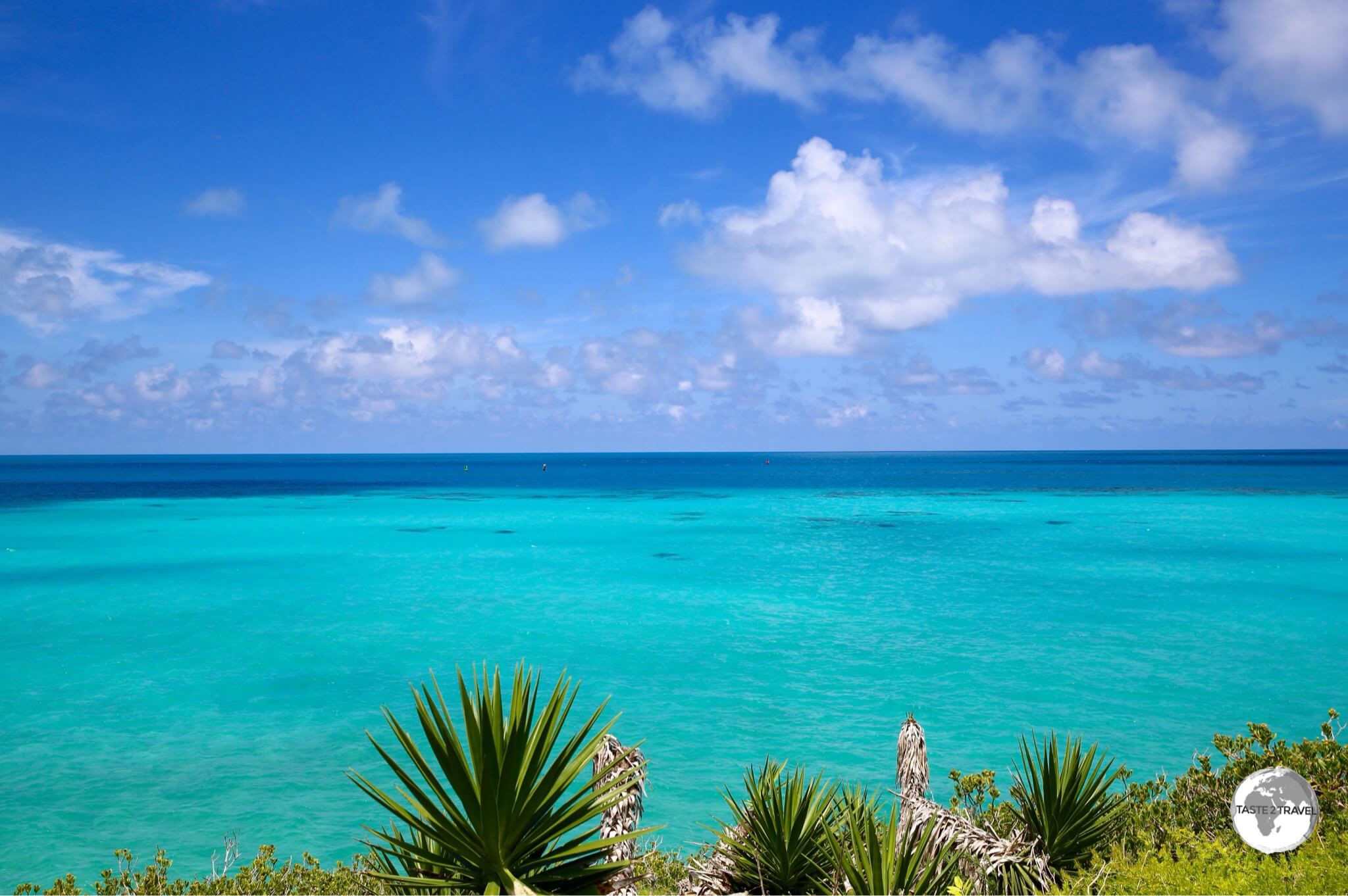
While it looks ideal, Bermuda is surrounded by a treacherous fringing reef which has claimed many ships in the past.
The fringing reef which surrounds Bermuda has claimed many ships over the centuries – all of which has created a diving playground. I did a two-tank dive with Dive Bermuda who have their shop at the Grotto Bay Resort in Hamilton Parish.
The dives cost just under $200 which included all equipment, boat transfers and as much water as you care to drink. Food is not provided on the (half-day) trip so if you get peckish between dives you should bring something along.
Our two dives were at the wreck of the Cristobal Colon (very fragmented/ dispersed wreck) and then North Rock, both a 50 minute boat ride from the island on the north-west side of the seamount.
Accommodation
In a word – expensive! Most hotels on the island are upscale resorts/ hotels catering to tourists with deep pockets. There are no budget hotels or hostels. If you are on a budget it’s best to look at options on either Couchsurfing.com or Airbnb.com
Eating out
There are a variety of restaurants on the island catering for all budgets. Most places which serve mainly tourists/ ex-pats charge high prices and additionally add a 17% gratuity to the bill. You can avoid all of this by eating in local cafes.
Local Restaurants
Of the local ‘cheapies’, my favourites include:
- Rotisserie Grill (South road in Smith’s Parish) – Always popular, this restaurant offers roast chicken meals with mashed potato and salads for under $15. Homemade desserts are also available.
- Pizza House Restaurant (several branches on the island) – makes a mean pizza and roast/ fried chicken meals with salads and vegetables.
- The Spot Restaurant (Cedar Avenue in downtown Hamilton) – cooking here is hit and miss but its hard to beat their prices. One of the cheapest places in the heart of Hamilton.
Tourist Restaurants/ Bars
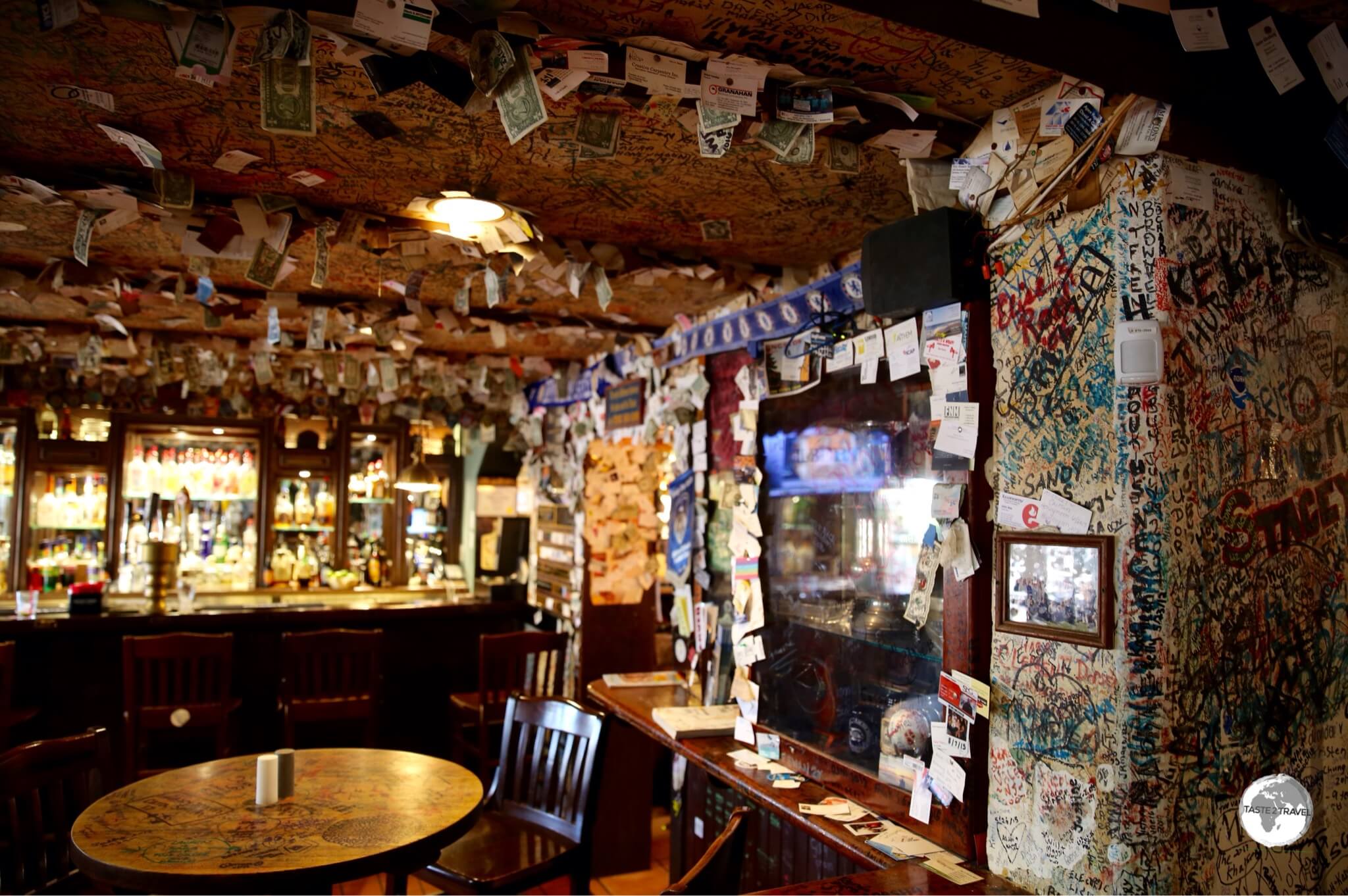
The most interesting bar on Bermuda has to be the Swizzle Inn, where the legendary national cocktail was created.
Of the tourist restaurants, the Swizzle Inn is a local institution, which was responsible for developing the national cocktail – the Rum Swizzle. For those who are thirsty, the good news is – there are two branches on the island – one in the north at Baileys Bay (the original pub – located across the road from the Crystal Cave) and one in the south on the South Shore Road.
Apart from great cocktails, the food menu is very good with blackboards dinner specials every evening and trivia and other activities during the week – plus you can leave a permanent mark on the island by adding your scrawl to the walls.

A Guinness promotional poster at Flanagan’s Irish Bar in Hamilton
Located on Front street in downtown Hamilton, Flanagan’s Irish Bar is popular with tourists and locals for its extensive food and drinks menu. A great way to soak up the ambiance of Hamilton is to have dinner on the balcony overlooking the harbour.
If you are looking for dinner or drinks in St. Georges, I would highly recommend the waterfront Wahoo’s Bistro & Patio. The menu at Wahoo’s combines local and European influences from the Austrian-born head chef (and joint owner) Alfred Konard. The fish here is especially good.
Cocktails
The national drink of Bermuda is the Rum Swizzle, which was developed by the folks at the Swizzle Inn but is sold all over the island.
How to prepare a Rum Swizzle:

The national cocktail of Bermuda, the ‘Rum Swizzle’, which was created at the Swizzle Inn.
Ingredients (makes 6):
- 4 oz Gosling’s Black Seal Rum
- 4 oz Gosling’s Gold Rum
- 5 oz Pineapple Juice
- 5 oz Orange Juice
- ¾ oz Grenadine or 2 oz Bermuda Falernum
- 6 Dashes of Angostura Bitters
Method:
- Into a pitcher ⅓ full of crushed ice – add Gosling’s Black Seal Rum, Gosling’s Gold Rum, pineapple juice, orange juice, Grenadine or Bermuda Falernum and Angostura bitters.
- Churn vigorously until a frothing appears or mix in a cocktail shaker.
- Strain into a martini glass.
Another favourite cocktail is the simple but tasty Dark ‘N’ Stormy – made with dark rum (the ‘dark’) and ginger beer (the ‘stormy’) served over ice and garnished with a slice of lime.

An island staple – the Dark ‘n’ Stormy cocktail.
Cafes
As with every other destination, I was on a mission during my 10 days to find the best coffee on Bermuda. Finding a good coffee is not easy but after an exhaustive search, I can say the best coffee is served at the Devils Isle Cafe in downtown Hamilton. The cafe is open from early morning, which is a good thing since their breakfast offering is also one of the best on the island.
If you’re anywhere near the Flatts village, you’ll be happy to know the folks from Devils Isle Cafe are also responsible for the Village Pantry. I was staying up the road, so I started most days with breakfast here and would recommend the Avocado Crush (like guacamole on toast) with a poached egg added on top.
The best coffee in St. Georges is served at the CV Cafe in downtown St. Georges.
Visa Requirements

Bermuda Passport Stamp.
Despite being a British Overseas Territory, Bermuda maintains it’s own visa policy. All flight and cruise ship arrivals into Bermuda are from just three countries – United States, Canada and the United Kingdom. All visitors to Bermuda must have a return ticket and the right to re-enter one of those three countries. You can check your requirements here.
Getting There
By Air
Around 1/3 of tourists (235,000 in 2015) to Bermuda fly into LF Wade International Airport – the only airport on the island. The airport is located in the northern parish of St. Georges and (due to the fact that most flights are between the US and Bermuda) offers US immigration/ customs pre-clearance, which means US-bound passengers clear Customs & immigration in Bermuda so flights arriving in the US from Bermuda are thus treated as domestic flights. At the time of my visit a new, bigger terminal was being constructed.
The following airlines provide flights to the island:
- Air Canada – Flight to Toronto–Pearson
- American Airlines – Flights to Miami, New York–JFK, Philadelphia
- British Airways – Flight to London-Gatwick
- Delta Air Lines – Flights to Atlanta, Boston, New York–JFK
- JetBlue Airways – Flights to Boston, New York–JFK
- WestJet – Flight to Toronto–Pearson
By Sea

Most tourists to Bermuda arrive on a cruise ship from the United States.
Around 2/3 of tourists (385,000 in 2015) to Bermuda arrive on cruise ships, with most being American tourists on ships from the east coast of the US. All ships berth at either the Royal Naval Dockyard (2 berths) or, for smaller ships in downtown Hamilton (2 berths).
The two berths at Royal Naval Dockyard, Kings Wharf and Heritage Wharf, occupy the same long pier, and is where most cruise ship passengers will find themselves.
The other two berths are located in downtown Hamilton, alongside Front street but due to overcrowding in town (when ships are docked), authorities allow few ships to berth in the capital.

A Norwegian Cruise Line ship, docked at the Royal Naval dockyard.
Bermuda is a sailing paradise and attracts yachts from around the world, hence a small number of visitors (less than 1%) arrive by private yacht.
Getting Around
Ferry

A map showing the four different Bermuda Ferry Routes.
Source: http://www.bermudaforvisitors.com
There are four ferry routes operating in Bermuda – a Blue, Pink, Green and Orange route. While I was exploring the island on my scooter, I always looked to incorporate a ferry trip into my journey.
Ferry journeys save a lot of time as distances across the water are considerably shorter than those on land where roads are narrow, windy and long.
Passengers pay $5 a ticket and you are able to take your bike or scooter on-board for an extra $5. The ferry journey from Hamilton to Royal Navy Dockyard is 20 minutes, versus the road journey of almost an hour.
Bus

Bermuda bus routes
Source: https://www.bermudayp.com
Government-operated pink (inspired by the colour of the pink sand beaches) public buses provide comprehensive coverage across the entire island on 11 different routes from the main terminal in Hamilton.
Fares are very reasonable, buses run frequently (i.e. until 7-pm) and service is very good. Since there is no car hire on Bermuda and taxi’s can be expensive, bus is a good transport option for visitors who do not want to hire a scooter.
Taxi
Taxi’s are available for hire, but like everything else on Bermuda, they’re not cheap. A taxi from one end of the island (St. Georges) to the other (Royal Navy Dockyard) will cost around $78.
Car

A fleet of Renault Twizy’s, at the Hamilton Princess Hotel in Bermuda.
There is no car rental on Bermuda, however a small fleet of electric Renault Twizy’s are now available for rent from Current Vehicles, located in the car park at the front of the Hamilton Princess hotel in downtown Hamilton.
The Twizy is an over-sized shopping trolley, able to carry two (smallish) passengers, with the second passenger tucked tightly in behind the driver. The cars were originally bought onto the island as support vehicles for the America’s Cup (June 2017).

An interior view of the cosy Renault Twizy.
Scooter

A scooter is the best way to explore an island where rental cars are banned.
In the absence of car rental options (and apart from the recently introduced Twizy’s), scooter is the only rental option for those who wish to explore the island independently.
There are various scooter rental companies around Bermuda, all of whom seem to charge similar (i.e. high) rates. Prices start at $55 per day and reduce on a sliding scale, so the longer you hire the cheaper it becomes. I rented my bike through (and would recommend) Oleander Cycles – my ten day rental averaged out at $30 per day.
All companies will drop-off and pick-up their scooters from anywhere on the island and they require all drivers to do a short driving test before they will agree to rent you a scooter – they will not rent you a scooter if you appear to be less-than-confident on two wheels.
That’s the end of my Bermuda Travel Guide.
Safe Travels!
Darren
Follow me on Instagram:
[instagram-feed feed=1]
Further Reading
Other travel reports from the Caribbean region include:
- Anguilla
- Antigua & Barbuda
- Aruba
- Bahamas
- Barbados
- Bonaire
- Bermuda
- Cayman Islands
- Cuba
- Curaçao
- Dominica
- Dominican Republic
- Grenada
- Guadeloupe
- Haiti
- Jamaica
- Martinique
- Montserrat
- Puerto Rico
- Saba
- Saint Barthélemy (Saint Barts)
- Saint Eustatius (Statia)
- Saint Kitts & Nevis
- Saint Lucia
- Saint Martin/ Sint Maarten
- Saint Vincent & The Grenadines
- Trinidad & Tobago
- Turks & Caicos
- Virgin Islands (British)
- Virgin Islands (U.S.)
Bermuda Travel Guide Bermuda Travel Guide Bermuda Travel Guide Bermuda Travel Guide Bermuda Travel Guide Bermuda Travel Guide Bermuda Travel Guide Bermuda Travel Guide Bermuda Travel Guide Bermuda Travel Guide Bermuda Travel Guide Bermuda Travel Guide Bermuda Travel Guide Bermuda Travel Guide Bermuda Travel Guide Bermuda Travel Guide
Author: Darren McLean
Darren McLean is an Australian, full-time, digital nomad who has spent 37 years on a slow meander around the globe, visiting all seven continents, 189/ 193 UN countries and 242/ 251 UN+ countries and territories.
He founded taste2travel to pique one’s curiosity and inspire wanderlust.




















Good stuff. Enjoyed the read.
Thanks for the positive feedback Mike.
Really enjoyed reading the article. I am going solo in November so got lots of tips. Thanks. Jane
Thanks Jane – pleased to hear the blog was useful for you. Bermuda is wonderful and I’m sure you’ll have an amazing time.
Safe travels.
Darren